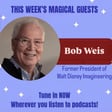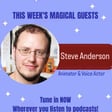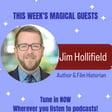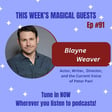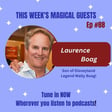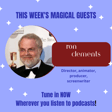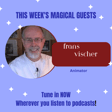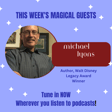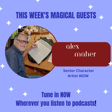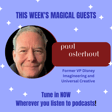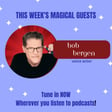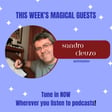Become a Creator today!Start creating today - Share your story with the world!
Start for free
00:00:00
00:00:01

Episode 77: Christian Hope
On this week's episode we chat with preeminent concept designer Christian Hope as he share many stories from his amazing career!
DISCLAIMER: We are not an affiliate of the Walt Disney Company nor do we speak for the brand or the company. Any and all Disney-owned audio, characters, and likenesses are their property and theirs alone.
Recommended
Transcript
Podcast Introduction and Guest Host
00:00:01
Speaker
Welcome to Sharing the Magic, the podcast that takes you on a journey through the enchanting worlds of Disney. Each week, we're joined by a special guest, whether they're a magician creating moments of astonishment or a Disney expert sharing the secrets behind the magic of the happiest place on Earth. Together we'll uncover the stories, inspirations, and behind the scenes tales that bring these worlds to life. So, get ready to be spellbound and transported to a place where dreams come true.
00:00:49
Speaker
him yeah
00:00:53
Speaker
Welcome everyone to this week's episode of Sharing the Magic Podcast, where each week we interview members of the vast Disney Universe that have been part of the creation of magic that we all know and love. I'm Brian Galloway, and thrilled to be a guest host today in place of our host Barry. And we have a terrific guest that I'm very excited to talk with. But first, let's say hello to the other hosts joining us today. Hello, James. James Kemp, how are you today?
00:01:18
Speaker
Doing great, Brian. Great to have you as a host, you know, this week and instead of Barry. I'm doing great. and And all this is dark weather in the Pacific Northwest. But, ah you know, I'm excited to be here. And we also have Lisa Branscom. How are you, but Lisa?
00:01:33
Speaker
I'm great. It was a balmy 52 degrees here in Indianapolis today. So I'm getting ready for Florida in a week. So I don't know that I'll be spending much part time since the rest of the world will be there. So, yes um, but I'll be happy to be there. And so I'm happy to be here tonight and excited to hear from our guests. And we also have Dawn Gunther from Florida. How are you doing?
00:01:58
Speaker
I'm in Houston, but yes, I was. Oh, OK. I feel like I live there. It's my second home. And now I'm ready to learn and hear all about our guest. Thank you. it's So nice to meet you.
Christian Hope's Career Journey
00:02:10
Speaker
We we really are really, really excited to welcome Christian Hope to our podcast. Christian, before we get started and peppering you with a bunch of questions, why don't you start with giving our listeners a little bit of a background of yourself and also especially how much Disney has impacted your career?
00:02:26
Speaker
Hello, everybody. I'm calling um from California, Hollywood, California. I live in the Hollywood Hills. Actually, if I look out my studio window, I can see Universal Studios. So I'm a little boy in Hollywood. Yeah. So I grew up in the industry. You know, I'm currently working with Storyline Studios.
00:02:41
Speaker
with Mel McGowan and Ben Thompson and all those wonderful people. And prior to that, I was at Universal. I've been rather Paramount Studios for about five years. But going way back, I started my career as a model builder and illustrator and set builder. I kind of learned the industry from the ground up and starting way back in 84. And I know a long time ago.
00:03:05
Speaker
ah but But I kind of, as time went on, I learned that my sketching and my art direction, creative direction stuff was kind of my strength. And and then so I went from ah ah you know doing that to working at Knott's Berry Farm. After that, I went i worked at Walt Disney Imagineering. I've been at Walt Disney Imagineering on three occasions. i I left a few times because I was hoping for more advancement and found out the only way to really do that is to quit and come back at a higher rate.
00:03:34
Speaker
And on and off, never an employee at Universal Creative, but freelance for them a lot. And then I had my own studio for creative development and concept design for various clients, including Disney and Universal, but also including like ah Virgin for Richard Branson and all a bunch of different companies. A lot of stuff in the Middle East, a lot of stuff in China.
00:03:57
Speaker
And that's, that's what I had my own company doing for about 15, 16 years. I did that on an independent basis. And then that led me up all the way to the time at Paramount Studios, which was kind of fun. Fun little fact about that was my parents actually met there because my mom worked for Lucio Ball and my dad was a music contractor. and ah So it kind of came full full circle, I guess, you know, working now at the at that that studio. As a matter of fact, the first office they gave me was about 60 feet away from where my mother and father met at the first time. So kind of cool, a little Hollywood story there. So that's me. That's awesome. Nice. see So you met you met Lucille Ball.
00:04:38
Speaker
Oh no, I was, well I was a little kid. I mean, even if I met her, I wouldn't remember. I was a little kid. that's really I mean, might be like I said, my parents were in the industry and so they had cocktail parties all the time. and Our house was constantly full of celebrities and people in the business. So that's kind of the the the world I grew up in. So a lot of people don't believe me when I'm telling the what wild wild drunken cocktail parties at my parents' house with all the celebrities and Hollywood folk. It was was a fun environment to grow up in. Well, we might want to hear that story too, but um yeah, my my story is nowhere near as interesting as theirs. Too bad there was a social media back then, right? Yeah, exactly. i They probably thank God for that.
00:05:20
Speaker
Well, I'll start I think we're gonna, we'll probably send you know, go back and forth and you know just ask a bunch of questions and we'll probably, I don't know how we don't i we don't really have it organized but that's okay you if you don't mind we're just going to go back and forth but I think sometimes things do segue and from one into another.
Designing Shanghai Disney's Mickey Avenue
00:05:35
Speaker
but um I just want to tell you the one thing that I'm very very interested in is because I have not been there yet and I'm I have not been to Shanghai. I've been to Shanghai but not not to Shanghai Disney. um I want to understand that's the one of the few parks that does not have a Main Street USA and you were you were working on you worked on um the Mickey Avenue Project. Yeah. Yeah. When I started working, I think it was back in 2010, maybe or so. They were doing early, early concept design work for that. ah My initial assignment was to work on Frontierland for that. um But as we developed that, we and we would share with the ah the business the the development partner
00:06:15
Speaker
We realized they didn't really want that. they The sort of Americana Western stuff wasn't really what they were into. um and So that went away and became a pirates. Mostly if you go there, the pirates land is enormous and it takes up most of that. What would what would normally be frontier land has now been dedicated to that part of the park.
00:06:33
Speaker
And then I worked on the that a little bit as well. um The challenge course is something I helped them develop and then a lot of live entertainment stuff. And then um the two other things I worked on, one of them is like the main street, as you said, they they didn't want again, they didn't really there was no appeal for the the main street that we have here.
00:06:52
Speaker
Uh, and then all the, all the duplications of that, uh, you know, main street. So what we had to do is, you know, come up with a completely different idea, unique idea that would be the entrance. And they're essentially their main street for the, for the park, that park.
00:07:07
Speaker
Um, it's a different configuration. That particular park has a lot of, I think it probably breaks all the records, even Japan for the amount of attendance. It's a huge park and it it really has to accommodate enormous and throngs of people have to go through that park. And so our concept that I developed with the Imagineering And also a couple of the old timers there, the guys, the Kirk brothers were there. um We work with, we work with another company called Bar Architect. They're they're based, and I believe based in San Francisco still.
00:07:39
Speaker
We came up with this ah idea called Mickey Avenue. And Mickey Avenue, the concept there was that the characters own businesses on Mickey Avenue. So if you go you go into like, for instance, Minnie's confectionery store, and Donald has a gelato shop. And so what we did is we broke up all the art yeah the retail and the you know, the food offerings into things that would be owned by the characters. And I think Goofy has a toy store, if I recall, you know, it was a couple of years back, but that was, that was a fun kind of interesting challenge. And typically that's what I'm brought in to work on, you know, new, you know, reinvent things a little bit.
00:08:18
Speaker
Then the other thing I worked on for that park was the Tron post show. Actually, the image I see behind on there is is from the Tron attraction. ah They sort of toward the end of the development of that park, an auto manufacturer over there wanted to partner with, I think it was a Chevron.
00:08:38
Speaker
and to develop some sort of sponsored post show. And they brought and brought me in to come up with an idea for what that would be. And so we did this thing, what we call Tron Realm, and which is a post show. Once you leave the attraction, you walk in into the post show. And so those are two good examples of my typical involvement. I'll come in and do concept design for what those experiences would be. So that's what I do.
00:09:03
Speaker
No, that's I mean, it's a lot of I mean, you know, Mickey Avenue, that sounds great. And it's a lot of pressure because that's the first thing that people see when they come in. So, you know, you have to set that tone. So I think that's that's really cool. With it, with the Tron, there's nothing like that in the Tron that's in Magic Kingdom and Anna MMS are in Orlando right now, right?
00:09:22
Speaker
Well, they didn't have a sponsor. So they they don't know a sponsor. Okay. Yeah. Well, you know, you said it's a, I look at it as a wonderful opportunity. I love to create new things. That's sort of my signature thing. I love to be the sort of and lead edge. Like, you know, later on in life, I worked on the, uh, the Mario Kart attraction, which is the first AR attraction. There's a lot of stuff I worked on, which is the first of its kind. And, um,
00:09:47
Speaker
I look at all these things as like wonderful opportunities to get to scribble and have fun and, you know, come up with ideas. So I don't get nervous about it, actually. I look at it. I can't wait to open up my present on Christmas morning. That's kind of of the same energy that I have for it to this day, even though I've been doing it since 84.
Creative Process in Theme Park Design
00:10:04
Speaker
Is that seen that the same energy you took into Disneyland Paris with Frontierland? Because you said you don't get nervous, but taking on a project like Frontierland in any capacity, you know trying because everything is trying to live up to the original, did you feel any of that with the drawing the concepts for you know Paris?
00:10:23
Speaker
Yeah, um well, I was a lot younger at the time. um I think that I was more susceptible to getting nerved out you know when it came to these assignments. But you I guess you know it's really funny. A friend of mine one time told me, it sounded like an insult, but it was actually compliment. He says, I wish I didn't think about the things the way that you don't think about things.
00:10:43
Speaker
and you have to mull that around in your head, or while you you really understand, it's really a compliment. I don't really get nervous about those things. When somebody gives me an assignment like that, I realize that's a real wonderful opportunity and a privilege to work on something like that, and so I just go at it. I i don't seem to have that in my DNA. I just ah you know i just go, great, let's just come up with a bunch of my ideas. The one thing you do have to get used to as a concept designer and a kind of a creative director in that role,
00:11:10
Speaker
And at the time, I was surely just you know concept design, coming up with ideas for things. You're kind of an idea ah icebreaker. Your job is to come up with a bunch of different ideas, throw them out the wall, it sort of that you know throw the spaghetti on the wall. You have to develop an understanding that you know you're going to have 10 ideas up there and three are going to get chosen. right you have to Your ego has to be able to maintain.
00:11:33
Speaker
And so I, um, that's the one thing I learned over time that you have to have that attitude where it's like, Hey, some of these things are going to go. Some aren't, you know, and, uh, I've, I've luckily had a lot go. Although I also tell people all the time, if you look at me, if if you look at my stats on paper, I feel like I was a baseball player. I look like a complete loser because I have thousands of thousands of sketches of her ideas, her things. And you know, maybe 2% of those or 10% of those got picked, you know,
00:12:02
Speaker
that's That's the whole thing about being a concept designer. your Your job is to, as we say in the concept design groups, we create wallpaper, ah meaning the sketches we stick up on the wall and see who it takes. so that's farther Are there any that you really look you look back on and say, I just don't understand why this was never chosen?
00:12:24
Speaker
Yeah, there's a few. um Actually, the thing I would be totally honest with you, the the last project I worked on at Paramount was kind of a heartbreaker of this thing in Bali. We were developing a park in Bali and it was hands down the most gorgeous site I've ever worked on. Bali is a beautiful environment and it's just a spectacular breathtaking scenery and we developed a park for a company. ah We had a development partner over there.
00:12:49
Speaker
And it was a gorgeous park. I work with a with ah Ty Granaroli, with Larry Wyatt at Paramount Studios and our team there, and then Hetzel, Branislav Hetzel and Hetzel Design. We're our development partners from the design perspective.
00:13:04
Speaker
And that one didn't go. the the The development partner backed out because I think maybe they bit off a little bit more than they could chew. And that was a heartbreaker because it was honestly this this gem that I was hoping we could build. And and then and that one, that one, that took a lot out of a lot of wind out of the sails for me. But whatever, you just dust yourself off and keep on going, right? Let's go on to the next.
00:13:30
Speaker
Was your major um architecture engineering or art design or what, I guess what started your desire to do this and then how did you educate yourself to know the field? Well luckily i but my uncle worked for Disney and so he invited me at lunch to go meet Herbie Ryman. Do you know who that is?
00:13:50
Speaker
or was rather, so i do and I got to meet him as a teenager. And wow my mother thought that I had some talent. And so he had introduced me and my and my whole family worked in the business, not necessarily for Disney Imagineering, but he did. And my his son, Frederick, they're both named Frederick, Frederick Senior, Frederick Junior.
00:14:10
Speaker
ah So I had those people as sort of my you know mentors and anyway back to the lunch with Herbie, I met him and saw his work and I knew how to draw and paint by the time I was in high school. But then you know I'd seen that in his studio that the drawings that he did were really from his imagination rather than like a still life of a bowl of fruit or whatever,
Inspirations and Pursuit of Art
00:14:32
Speaker
which didn't excite me.
00:14:34
Speaker
I didn't want to be an illustrator. I didn't want to do anything like that. But when I saw the fact that this guy, I could draw stuff that was from his imagination, it really inspired me. I thought to my... And by the way, he was an old man at the time, but he had the the sort of attitude of a young man. And but I thought, this is something that will keep you energized, you know, if you're able to develop that skill. so I immediately got inspired by that and through high school, even though I was playing sports primarily, I had this little tickle in my brain, like someday I'll do that. And so eventually I got more into art and design, things like that. Luckily I went to a ah prep school where they they allowed me to take college courses and I started, you know, at Otis Parsons.
00:15:14
Speaker
In terms of majors or anything like that, I gotta tell you, Don, I was a terrible, I mean, I wasn't a bad student. I hated school. I'm not an academic person. I learned on the job. That's how most people learn. And I think I've had to produce my degree maybe once in my entire career because they you know people don't judge artists based on their on their documents. They base it on their skills and what they can produce. And so ah that's, I mean, I don't want to encourage anybody to quit college.
00:15:40
Speaker
but I would say that in my case, i like I said, I think I had to show it one time and that was it. But ah you have to study architecture. i mean you know um The about working in this business and the theme entertainment business when it comes to like Disney and Universal, and so if you go into a the theme park,
00:16:00
Speaker
just look at a theme park and see what you see. You see restaurants, you see retail, you see attractions, you see environmental design, you see all those things graphics and everything go with it. If you want to be a concept designer, you have to understand and appreciate all those things. And so, is there a degree that teaches you that? That's a little quiz question. therere By the way, there thanks there is.
00:16:20
Speaker
No, there is there is not. So I eventually put together, I went to my college counselor and I said, look, can I put together something that i of my own design? And I don't know if you guys know who Adam Bezark is, the Bezark company. He did the same thing I did. Basically, we didn't even know each other's design. We put together kind of our own program.
00:16:39
Speaker
because I wasn't getting out of college what I needed. I needed to understand how these they didn't have a program for it. So you have to and luckily Otis was ah loosely organized. let I'll put it that way. And they were they were allowing me to do that. So what I did is is I stitched together a program that, you know, kind of the four squares of, you know, entertainment design. So it was architecture, and interior design, retail design, graphics, illustration, all that stuff.
00:17:09
Speaker
and cobbled that all together and they called it a, ah you know, gave me a piece of paper so I can walk out the door and then start really learning that at my job. but You got a self-made degree, like a self-made major. that's Pretty much, yeah. Very cool. Yeah, I know. Well, because Like I said, they were not beholden to one degree or the other. They were like, yeah okay, that makes sense. And, you know, very interesting thing. Like I said, Adam Bezark did the same thing and that we hadn't even met each other. And that's the one thing that we talked about later on in life. It's like, oh, my God, you did the same thing I did. Very, very cool. Yeah.
00:17:42
Speaker
So I guess I um also wanted to just ask a few more questions about some of the work that you did at Disney, having some friends that work for Imagineering, and they create lots of concept art, a lot of concept art, um and not all of it goes through. And and some of those things that I wanted to know about some of the things you created. Are they are are there any in the US parks currently? um Things that look still somewhat like what you originally drew?
Concept Art Challenges and Successes
00:18:17
Speaker
um Were there any big surprises once things um were put up that you you thought, oh, that's not what I envisioned at all?
00:18:25
Speaker
Has that ever happened? Yeah, there's a lot of stuff I did. Like I said, like it's hard to explain this a bit. First of all, a lot of people don't have the experience of being in concept design where you go into brainstorming. your ah Your goal is to come up with a bunch of ideas.
00:18:41
Speaker
For instance, when they were opening up Studio Tour in Florida, the the MGM at the time, the MGM Disney Studio Tour, we were brought in the week that it opened actually to come up with a whole bunch of ideas for phase two, the the second iteration of what we want to do. And one of those ideas was that I came up with, and like guess like I said, my my sketch was a five by seven note card. I did a really quick sketch. I was a big fan of sci-fi films and also driving culture.
00:19:08
Speaker
I came up with this idea for the drive-in sci-fi drive-in theater and it was sci-fi drive-in theater wrote a note and did a little scribble sketch of what that could be and then I gave some reference material and that was that was my total involvement you know soup to nuts that's all I did and later on I saw Bill and I walked in I go oh that's cool And somebody asked me, they said, well, aren't you upset? is it this Is this what you envisioned? I go, I don't know. I just had an idea for what this thing could be. And I i trusted the the designers, the interior people, and the the restaurant people, the food and beverage people to come up with something that worked for them. And I was a concept designer for the Walt Disney Company. That's what my job was. um In terms of stuff that ah
00:19:48
Speaker
I'm not, I don't really have anything that ah came out that i was disappointed. I was a little bit miffed that they actually re-themed the Tower of Terror and in DCA here because I worked on that. And they came up with this, I thought, kind of lame idea of like doing the Guardians of the Galaxy thing. um I don't know, have you guys been on that attraction? I i was just on it recently, actually for the first time. and i would I mean, I thought it wasn't...
00:20:15
Speaker
They did a decent job. I mean, I'm a big Tower of Terror fan, the original, but I don't think it. I mean, I don't know. It could have been worse. I like it. I like it. I'm a huge Twilight Zone fan, period. Like the show and then Tower of Terror was amazing because being on the West Coast, that was my only chance ever, right? Because I've never been to Florida.
00:20:39
Speaker
And the story was great, the architecture was great, just the overall about it. And like you said, the concept for Guardians, not the dog onyx, it is one of my favorite. it's It is a nice attraction and a nice offset to ah Avengers Campus, but it's just not the same. It is not the same.
00:20:57
Speaker
yeah Well, you get kind of caught up in the energy, right? Bouncing up and down on the thing and blah, blah, blah, all that stuff. But here's, here's the thing that I told, it's funny because I was there on opening day and I was, you know, having been an Imagineer, I get to, I get to rib all the people that work there and they're all very proud of it, right? And I said, well, you know, I know this story about the, you know know, the collector, right? And they're like, yeah. And I'm like, well, if he was a collector, I could have saved you about $20 million dollars on this attraction. They go, how how would you do that? i go Well, if he was a collector, why can't you just write in the script that he collected the Tower of Terror from DCA? Right. I mean, think about it. 20 million bucks. I got crickets on that particular comment. No, I could see that.
00:21:39
Speaker
Well, I mean, you know, you know, i' it's you know, you've been in the business a while when you see attractions you worked on either get closed, torn down or changed, you know. But, you know, I worked on the ah kind of very have very similar. Well, not similar, but though very happy to say that the ah the Jungle Cruise Kew building was one I worked on with Eddie Sotto. We reimagined what that would be. And they built it it basically what we came up with, the design we came up with.
00:22:08
Speaker
Yeah, a lot of stuff guys. It's, it's really funny when I think back on it, there's all these things that I was involved in pieces of it. And I don't want to take credit completely for everything because you know, of course we have, we were, it's a very collaborative business and he gets to work with interior designers and engineers and architects and stuff like that. But you know, these are things that I would support the team with concept design and also sketch, you know, I'm a sketch or artist and stuff. And that's what I would bring to the team.
00:22:32
Speaker
the ah you know The stuff in Paris was really fun. the The one time I did really had to pinch myself that I was working on was the Haunted Mansion because next to Pirates of the Caribbean, the Haunted Mansion is my favorite attraction for Disneyland here is if you know as a kid. I was really inspired by that.
00:22:48
Speaker
And so working on that was really wonderful. Jeff ah jeff Burke, the guy who was a producer like that, gave me a lot of opportunities to say, give me some sketches, give me some ideas of what you think would make this really, ah ah really bitchin' attraction. So, but you know, i really I was really lucky in that regard where people saw my kind of my strengths and they let me just kind of go at it when it came to concept design. So that was when I worked on it. Like I said, I've Like, wow, am I really doing this? You know, this is really cool. You know, because, you you know, you're taking something that's kind of on the altar, right? And you're like reimagining it. And so you have to sit there and go, geez, am I really doing this? I better I better do it right. I don't want to screw this up. yeah know And the fact that but the fact that you know, that is important. The fact that you know how important it is in the Disney lore. So, you know, if you didn't know that and just tried to make changes without without understanding the history, I think that would have been tougher. But the fact that you knew that is good.
00:23:41
Speaker
Oh, yeah, you have to. I mean, the legacy of Disney is is anytime you touch anything there, like we were for the 50th anniversary years ago, we had to decorate and come up with ideas for what the castle was going to look like for that you know anniversary. And again, you're sitting there touching this iconic element. OK, what am I going to do here? That's not going to either you know violate people's memory or anything like that. You're going to be be respectful. So there's this little zone, little pocket you have to get in there.
00:24:08
Speaker
to do, you know, for your work and stuff. And so it's it's it's challenging, but rewarding, ultimately, honestly. So yeah it's not like you're killing off Han Solo or anything like that. um James, no, James actually used to work at the One Dimension. Yeah, he took my took the words out of my mouth. that I had to say, yeah.
Maintaining Disney's Guest Experience
00:24:25
Speaker
Yeah, as a former cast member and working at Honey Mention at Disneyland, hearing you say that about the the care and the love and understanding the story and the meaning of that attraction overall and putting it somewhere else, that actually made me smile really big because I'm like, As a cast member, that's what we're we're taught is working there is like, you have to take care of this such attraction. This is, you know, your home, you embody this, you embody that story. And here it's, it was translated with that same care to someplace else, even makes me feel better. You know, imagine knowing you, you expect that, but just hearing it from a cast member perspective, because we hold that place in our heart, just like the way you, you, you know, you described it yourself.
00:25:08
Speaker
Oh, yeah, you have to respond look, you know, these people in some cases save up for a lot of save up for a while to come to these parks, you know, and they bring their kids. And, you know, as a matter of fact, one time we before the park opened one day, we were down there for a tour. And one of the guys put into, you know, one of the back of house guys was moaning about, you know, you concept designers don't think about, you know, us, you know, I have to get up at four zero in the morning to make sure the park opens. I said, yeah, you're right. I don't. I think about the single mom who saved up for two years to bring your kids to the park and we have to deliver a once in a lifetime experience for these people. So yeah, you're right. I don't think about you. I think about that. Those people are our guests and, uh, you know, you know, ah think about, you know, I'm sure as a cast member, you understand this. It's like putting on a, uh,
00:25:55
Speaker
It's like putting on a yeah ah birthday bar mitzvah, and New Year's Eve party every single day of the year. Right. I mean, it is just amazing. of This guy, Brad, I work with all the time. He said to me, theme parks are more complicated than nuclear power plants because they have so many different functions that they have to all have to come together every day. You know, it's amazing when you think about it.
00:26:19
Speaker
It really is, and the way I looked at it when I worked there, I i had to put on that costume. Those costumes are not are not comfortable, but the one thing that I took away from traditions, when because we have to go through traditions, was, you know, what would Walt do? That's ultimately what it was. What would Walt do? How would he present himself, regardless of how hot it was, regardless of what's going on in the park?
00:26:40
Speaker
yeah you're You're a part of the show, you're not the show. And to complain in the back, i I take the same mentality you do. I'm there to provide a service for somebody who's having a once in a lifetime experience. And no matter how bad their day might be or how bad day, how my day might have become bad in a way, I still try and put that on that smile and go out there and do the best show I can because that's what, like you said, they pay for.
00:27:06
Speaker
Yeah, well, you know, when I was at Knott's Berry Farm, I worked in the design and planning group and I worked on graphics and, you know, we were head of design studio, but every employee that worked there had to, you know, bag a house, had to, when you went on stage,
00:27:23
Speaker
You had to behave like a cast member, you know, and you you had to be very congenial with people, yeah all those things. And they trained you how to do that. And that's when I really learned, you know, you like you said, you may have a bad day, you may be hungover or whatever the hell. ah yeah You need to walk on to that, you know, guest area. And you're now an ambassador of the company. And I firmly believe that. I mean, as long as they keep that up, I think that's important. I've seen at times when it's not the case. and um I have a couple stories where I had to report back to Marty Sklar, who was you know the head of imaginary for a couple times you know ah for most of the time I was there, for all the time and I was there actually. I had to go go back to my city. We need to look into you know some of these situations, in Florida in particular, because the park is so big.
00:28:10
Speaker
um There's been a couple of cast members that I had issues with and you know when you go down there, it's like you're being perceived as a heavy, but you need to keep up that show standard that has to be there. it just really Otherwise, people aren't going to return or they're going to have a bad experience. and Again, it's a very you know it's ah it's not a cheap experience to go do and you want to make sure that people get their money's worth.
00:28:32
Speaker
So let me go to Marty Graham. I've heard about Marty Graham's, hearing Bob Gerst speak. I had a few of those, yeah. Yeah. I heard Bob Gerst speak over the summer at ah at ah an event in Seattle and he talked about their relationship and how many Marty Graham's he got and how much, and just how much fun they were to degree, but to get them, you knew you were in trouble.
00:28:53
Speaker
Well, yes and no. he He would compliment you. And then he would have notes, essentially. It's his version of notes. You know, you'd have to make sure that, they know how you know, you covered what his concerns were. But I'd say John Hench, so the the biggest compliment I ever got was from John in terms of the old guys.
00:29:09
Speaker
John Hench had seen, I worked on and and in ah Japan. We, myself, Eddie Sato and Mark Engberg and our team, we did um the Bon voyage retail store that' just outside the Mohammed train station. And the way that we depicted the characters in that in that area, John Hench ah had me come to his office and of course you think, oh God, this guy's going to you know spank me or something. I don't know what's going to go on. He goes, ah He says, Christian, you're the you're the art director of this whole thing? I said, yeah, me and Eddie Saudi goes, well, you you did a great job. You captured the essence of what the characters are. And it was like a huge compliment, you know, and kind of walk out on cloud nine when somebody like John hen, she was like a serious designer, you know, that, you know, so that was, that was a big moment and for me in terms of getting some accolades from the big boys.
00:29:59
Speaker
Yeah, john just hearing John Hinch and Marty's clone like within those same two breaths That's amazing because they said John Hinch is a legend at Disney. He meant a lot to design. Oh, yeah Yeah, he was I sat across from him while for the most time I was there i actually sad what they called the Gold Coast imagining It was like when they would walk celebrities in or people from you know, whatever they're trying to entertain people They would walk them through the Gold Coast And they had two artists there, myself and John Horny. I don't know if you ever heard of this guy who's a Disney artist. They had us there because we drew. and And when people came into the studio, they wanted to see people that drew, right? They didn't want to, you know, they wanted to see that. So they, they stuck us there like performing monkeys.
00:30:43
Speaker
and We we would have, you know, we've art director offices in a way that made us look like we're these, you know, crazy, mad sketch artists. And it was really interesting. ah I remember sitting there one time and leo Leonardo DiCaprio walked in because they were touring him around Imagineering because they would tour celebrities and people like that all the time. It was really interesting to sit there. And of course you had to sort of be an ambassador of the company. It was just fun. It was a fun experience. But You know, when Michael Ovens was there, he he was very much into celebrity cultures, obviously being an agent. So he would bring these people by for tours. Cindy Crawford and Oliver Stone and all these people would come by to visit. And they where you know John and myself were sort of the embodiment of you know sketch artists that they were expecting to see, obviously. but between your Between your parties at your house and that, you you've you've experienced a lot of celebrities there. Oh, yeah. Yeah, definitely. Well, it's Hollywood. Yeah, definitely.
00:31:37
Speaker
I have a question about Mickey Avenue going back. um I wanted to ask it a little bit ago. So you know how Main Street has a forced perspective? Does this also have that? And then if it does, is that something that you suggest or is that something that the architects do when they're making it? So I'm imagining you sketch it. So do they Do you work with that or how detailed do you go into the actual once they say, yes, we're going to take your sketch and your idea? Do you work with them hand in hand to make it look like that? Or do you say, well, it should be forced perspective and you should have the second floor smaller or things like that? Or do you just wash your hands and say, OK, good, you chose my thing? Well, I have to start off with a correction for you. It's that is not forced perspective. That's called reduced scale.
00:32:26
Speaker
you do scale okay like and A good example of forced perspective is in Pirates of the Caribbean, when you go into Tortuga, the scene that's, you know, it's all on fire and you look up the street, you know, there's one little vignette where you look up a street. That's the first perspective where what happens, look through a vignette and the scale and vanishing point reduces as it goes.
00:32:49
Speaker
because there's very little room to create what it perceptively visually looks like a bigger area that's force perspective when you actually reduce the scale like main street is probably the best example where you go to five eight scale and half scale ah as you move up um yes you work with the architects depending on what actually happens behind those facades.
00:33:09
Speaker
um You have to work with the architect to make sure that works out from a structural point of view. And and most of that stuff, you know when ah when well once you're beyond the first and a half level, it goes into reduced scale. And so you have to make sure that whatever's behind there, you're covering up you know perspective-wise and also architecturally. But yes, on Mickey Avenue, that was used quite a bit. We reduced the scale as it moved up because we wanted to give the sense of a larger kind of volume.
00:33:39
Speaker
So yeah, we we did that.
Themed Dining and Character Shops
00:33:40
Speaker
And yes, you obviously work with architects and engineers to pull all that stuff off. Because think about it, there's a lot of stuff behind there. There's lighting technology, there's all this stuff behind the scenes that people don't even see. And you have to make sure that you cover that up with facade and teamwork.
00:33:56
Speaker
yeah So I didn't mean to come down on you there, but that would say- Oh, no. i Hey, i'm as I said at the initial introduction, I love to learn. And that's what I'm here for because I learned something every time we have a podcast. It's amazing. But and one other question. So when I did the Main Street Tour at both California, Disneyland and Disney World, they have the windows that are, they have meaning. Are there any hidden meaning on the Mickey Avenue windows or anywhere in any of the other things that you've done?
00:34:24
Speaker
ah Since that time that we did it, maybe they've added some stuff. It was all pretty straightforward, I mean, because we we really didn't... you know, the proprietors were the characters. So like in ah the one here in Disneyland and in in in Florida, the proprietors were, you know, they would have, you know, Tony Baxter's, whatever. They'd they'd get in a famous Imagineer or something like that. Dick Newness, or, you know, they'd make sure they did some proprietor kind of, you know, stencil on the window. But they didn't really do that and in in Shanghai, as far as I know, because again, the proprietors are the characters.
00:34:58
Speaker
So there's all kinds of wacky show graphics all over the place, but they're not that type. And that may have occurred but without my knowledge because I only got as far, my involvement only went as far as, because this is i when I did that, I was working as a contractor.
00:35:14
Speaker
So when you work as a contractor, you you set out a contract that gives you so many hours on a particular project. And my hours, by the time they were getting into construction documents, we're pretty much done with. So I i didn't fall through with what the graphics might have gone here and there. But a lot of the stuff we did ah from the conceptual level went through. um Like if you if you go there ever, you'll see that there's a ah quick service restaurant which is based on It's called, I think Mickey and Powell's Marketplace. You go in there, you it's a quick service restaurant, so you go there and it has to accommodate like 600 seats. So what we did is we broke it up into ah one, like a it looked like you got your stuff at ah a sort of like a farmer's market and you took your food and you ate in different themed areas. And one of them was Tony's restaurant from ah Lady and the Tramp.
00:36:03
Speaker
I love it. Yeah, we chose to do that because I didn't want to, i didn't want to you know, as a guest, that you have to think as a guest experience of what you would see. Like you get your food, right? You don't want to walk out and see the sea of tables, you know? I want to be able to have a little containment when I go eat my food. and So we broke it up into three different areas. One of them is like it looks like it's kind of a loading dock and it's based on the three Caballeros.
00:36:27
Speaker
um You know, we tried to grab, you know, ah the themes that we thought work from a dining experience. And if you go in there, there's all kinds of like fun show graphics all over the place that, you know, harken to. They're kind of like ah Easter eggs, right? You know, you try to make sure that you drop in some stuff from Disney past and present. Did you pop in any hidden Mickey's in there?
00:36:49
Speaker
The only Hidden Mickey, when you when you were given the the overall creative role for a thing, you were then allowed to pick out the Hidden Mickey. And so the Hidden Mickey that I was able to create was for Tower of Terror here in California, DCA. And I tried to be as subtle as possible, and really what it was instead of having it be an architectural detail or something that I've seen before. I created a hidden Mickey and it was a pool of light that was in the corner of one of those right next to a show scene. And it was Mickey. It was Mickey Mouse, you know, silhouette, but done with like three spotlights. Very, very subtle. And I did it on purpose. And and I always ask people, like, did you just did you find a hidden Mickey? I don't believe they have it there anymore. But in there was like, no, I didn't see it. I go, oh, good.
00:37:38
Speaker
like We could go walk and try to find it. It took me years to find it, but I found it. yeah Very, very subtle though. I wanted to ask, and this is oftentimes Dawn's question, but I'm curious with your your lengthy ah career, um what is your all-time favorite attraction? Could be Disney parks, could be any parks at all.
Favorite Attractions and Immersive Storytelling
00:38:05
Speaker
and Well, hands down, Pirates to me is my favorite attraction. And thats in which? Disneyland here, like, like, so my uncle had a silver pass and he would allow, you know, give it to my, he was able to sign us into the park when I was a kid. I didn't go there a whole bunch, but as a little kid, the first time I had seen that, I was with my dad, we were in the front part of the boat. And then you go down that little, you know, splash down, then you come around the corner, you see that that skeleton um you know with the behind the wheel of the of the ship. And there's that wonderful scene. As a little kid, I've told this story a couple times. I was completely transfixed on that. And I was a little kid. So I i remember crawling over the people in the cars behind me to keep my eyes on this scene. And then I demanded my father take me back on the ride like two more times because I had to see that scene again. There was something about that scene that really transported me to that.
00:39:01
Speaker
deck of that crashed you know ship. and that would So that's always had a big place in my heart, you know and I love the whole attraction. and Think about it, like, you know the scenes in that ride, when you go in the boat and there's there's where you're going through the cat of the sort of you know caves and stuff like that, what ride give today would would allow that much air, you know what I mean? Every attraction you see, like start the Star Tours attraction, that says You're being barraged with images and in motion and all that stuff. That scene does this wonderful setup where you feel kind of scared, right? And anticipation of the next thing that's going to happen to you. Think about what ride would do that of these days. And I think that we need to go back to that kind of thing where you get to kind of absorb the the atmosphere of those things.
00:39:51
Speaker
Having said that, my so one of my second favorite attractions is a new attraction, the ah the Avatar of Flight of Passage, I think it's called. Yes. Or that is brilliant. You know, I thought that was really it' spectacular. And it's the polar opposite of obviously.
00:40:07
Speaker
you know, pirates where you're just, you're going on this thrilling adventure, but that is, that is quite amazing. That attraction, do completely visceral, right? you're You're completely, you know, on the, you know, that vehicle, it's just amazing. So I love that attraction.
00:40:23
Speaker
I was going to go back to your point on um pirates because it's immersive storytelling. it's their like There's not much of that anymore. It allows the story to breathe in a different immersive way than say, like you said, the polar opposite of um Avatar. I've never written it, but I've heard great things, but it's it's like the action-packed.
00:40:43
Speaker
this it's It's all up in your face, but, you know, Pirates Mansion, there's a few rides, you know, that allow you to feel the story instead of having to feel it like all at one time. It does room to breathe. I think that goes to great whole story. Yeah. ah Well, it's it's a great feeling, right? You're in there and you're feeling the story. And, um you know, rather than shoving it down your throat, you're actually able to feel it on your own terms.
00:41:11
Speaker
And when I was a kid, I remember being spooked, you know, I was like, oh, God, what's around the corner? I mean, if I were able to work on something like that, that had that kind of, you know, allowance of just saying, you know, OK, allow people to sort of breathe for a while, then then get into the next scene, that would be that would be amazing. You know, we tried to do that with we tried to do that with Disney Paris, the Haunted Mansion there.
00:41:33
Speaker
where if if if, I don't know if you've been on it, but if you do, on it probably changed since the time I worked on it, but we wanted to feel cinematic. And so there were scenes that were lower key. the You go in for in some parts of it are very exciting. And then we we take you, there's a, there's a sine wave to how we lay out the experience. And that was all deliberate, you know, and even the soundtrack is cinematic. It was a,
00:41:57
Speaker
yeah the new soundtrack that we worked on, and now this is back, way back when, and but was meant to be a waltz. and We took the original song and turned it into a waltz, which gave it a real sort of heavy vibe to it, but but still, you know, again, try to stand a cinematic, you know, a world of of what we're trying to create, as opposed to the one they had here, which was very kind of chaotic, right? I mean, the stylistically, and the one the the one in disneyland paris of Disneyland here in California, it's kind of chaotic in the sense that some scenes are wacky and fun, some scenes are spooky. you know This one is spooky all the way through, the one in Paris. and so and But I heard recently they've changed a lot of the scenes, which I haven't haven't been able to look at.
00:42:42
Speaker
but I didn't even know that, yeah. Oh, I was thinking one thing like with with pirates and and with Flight of Passage, it you have multi-senses. You've got the vision, the hearing, you've got you've got the feeling of the air moving. you know Those things, you can probably go right back to it because I think even with the scent of pirates, you know you all it takes is that little snippet of that smell that when you're going around um the ship, you smell that bromine, you smell the gunpowder, you smell all of that. Though that's one of our favorite um rides in my family. We tend to, I don't always win, I don't always want to, but oftentimes our first ride is Pirates and our last ride. of and i but that's That's a favorite here as well.
00:43:36
Speaker
Well, it's the classics, right? Those are the ones that really established that that that kind of attraction, right? those you know And everybody since um that time has been trying to do that, you know the classic dark ride you know that really you know surrounds you with the environment and thematic stuff. It's theater. you know The thing about think about those dark rides is it's theater you get to ride around in. It's of the movie you get to what you know move into and see the characters in three dimensions. And so that's what's cool about it.
00:44:06
Speaker
and it developed into a movie like so with you know a successful movie. where where Some of the other ones, like you know Haunted Mansion, I'm sorry, you know and none ah none of the movies really moved me too much, but The Pirates became a movie that became a hit. you know that's That's pretty amazing. From a ro from a an attraction, which is which is Terrific, you know. Yeah, they haven't been able to duplicate that. I mean, Tomorrowland was a bomb and ah both both Haunted Mancers were kind of turkeys. So it's too bad. But ah maybe something will come. Maybe they'll turn teacups into a major motion. pick Yeah, the country banjamboree was not a good movie. Yeah, yeah that wasn't good. Frontierland. Frontierland. That's what we need. There you go.
00:44:51
Speaker
Well, i you know, it's really funny because back when I was in Imagineering, they asked us to like come up with ideas for what would be cool based on the rides. And to me, Matterhorn was the one that I developed. I came up with an idea for what the Matterhorn could be where, you know, make a lot of the monster. And there of course, there's a treasure within the Matterhorn that they were going after. and we had We had a moment where we got to pitch that to the studio and it never went anywhere, but that was the one. kind Because I liked the Matterhorn as a kid because it felt kind of like you're going to be thrown off it. There was a bit of danger. The one in California was like, holy crap, am I going to get thrown off this thing? But so you know how how cool it would be to do a movie where your classic action film where you get to get threatened by that that that yeah that creature, the abdominal snowman. Harold. That's his name, Harold. but What's your favorite part? So you have you been to every park?
00:45:47
Speaker
Uh, yes. Yeah. Um, let me think. Yeah. I've been to every Disney park. So what's, what's your favorite? I mean, it's, I know it's a tough one but because then you you worked at somebody. but but okay got I like Disneyland. I mean, it's like the scale of it ah to me, the, the other ones are too big. Uh, I like the scale of it, the castle, it's smaller scale. It's just, you know, everything got bigger, better, taller. Uh, it's just not my thing. I like the smaller scale stuff. ah four trust Interesting. Very interesting.
00:46:17
Speaker
Plus also the respect they have for it being so groundbreaking. I mean, what they did with that park was just astounding. You know, when you really think about it and, you know, it's easy to nowadays for people to forget what a darling Walt Disney himself was for the world and for America and the stuff they did. I recently watched a documentary about what his contributions to the country, the war effort and just, you know,
00:46:44
Speaker
how brilliant that guy was and how enthusiastic he was about creating this kind of stuff was just amazing and and when that park is a tribute to his his vision and and then as time went on the the stuff in florida i mean it was brilliant what they did there too but on the scale i mean the first i went to florida you know as we're landing i'm looking out saying all this stuff and this guy leans over this producer he goes that's all disney property i'm like oh my god you know so i grew up with the disney land here which is small scale and then you go there it's like unbelievable the park in shanghai is enormous uh it's bigger it's like this it's bigger than i think uh tokyo is
00:47:23
Speaker
There's just a level of ah commerciality to it that I just, I'm a different, I'm 61 now, so it's like, again, I grew up in a different era, so the the smaller scale stuff to me has a lot of charm to it. When it gets to that scale, it's just kind of overwhelming to me, and the one in Hong Kong.
00:47:39
Speaker
is ah I don't know if you guys have been there or not but that one's i've not smaller scale park and it's it's it's they kind of didn't go with the same hub and spoke concept there it's a different it doesn't feel like to me that much of a Disney park frankly feels different. Have you been to all of the Disney parks? Oh yeah.
00:47:57
Speaker
Wow, that's my goal. I haven't done that yet, but on it I was hired to go there to do stuff. They would send me there. to should I should be so lucky. You need to do clean all the trash or something. that would I can't to save my life, but definitely on my list.
00:48:17
Speaker
Actually, for I think it was 1991, 1993, my job was to go around to all the parks and come up with ideas for what would improve them. That was kind of my assignment. So they would stick me on a plane. I would go to this park and come up with ideas for whatever. And so that was kind of a dream job for a while to, you know,
00:48:35
Speaker
go there, experience it and then come back with ideas on what we could do to improve it. It was also an SQS show quality standards effort because in some cases, particularly the the park and in um France later on, the upkeep in that park was not Disney quality. So we had to make sure that we went out there and reported on that and and then come up with ideas of how they can improve that.
00:48:58
Speaker
So, you know, as a designer, a creative director, your job is to also try to maintain the Disney quality level of experience for the gasses.
Walt Disney's Legacy and Vision
00:49:09
Speaker
I just going to say, maybe you already answered this and I missed it, but what is your favorite of the Disney parks? Oh, here, this one in California, the Disneyland, yeah.
00:49:19
Speaker
OK, and then I wanted to also announce to our listeners that today is the anniversary of Walt Disney's death, December 15th. Yes, theyre really. OK, wow. I love that film, Saving Mr. Banks. To me, that was very I got actually kind of choked up watching the the movie because ah is my uncle would tell me about Walt Disney because he worked directly with him. He knew him that to me and my recollection of my uncle's account of what he was like.
00:49:48
Speaker
Tom Hanks's depiction of him met that in terms of the kind of person he was. And ah so that was, that was, that was a special film. I think, I don't know if you guys have seen it, but it was yeah like three times. very yeah The scene where he goes and tries to get, goes to England and tries to convince her to allow him to make the film was, was beautiful. And so humbly done, right? I mean, the way that he he, he's, you know, I think that she thought he was kind of a hayseed, right? But then when he reveals he knows what the story, her story was really about, was a powerful scene, you know? And she she she comes to realize this, okay, this guy's not such a Midwestern dummy. He knows what he's doing. He, you know, he's sharp, you know? So that was a really powerful scene. So I, that was a special film for me. so I've had the opportunity to actually go to Marceline where, um you know, he was kind of from and go to the farm and go to the museum there. And there were handwritten letters that he had wrote. And he was a very articulate man, very smart man. He he knew, like you said, he he wasn't a dummy. He was just very smart. And he he hears a stoop as to how the world worked. Mm hmm. Is what it seems. Yeah, we go ah we go every day. I don't know if you guys have been to the Los Angeles, been to the Tamos Chantar. That was a place where he would often
00:51:07
Speaker
have a few drinks and have dinner and we go there and we try to always order what he ordered. And, you know, as as an imaginary, you're like, oh, this is cool. I'm hanging out. We're Walt Disney. And I got what did he what does he order? Because I've been to the Tamos Chantor and I had a tour, a private tour of the barn. while ah And so they the tour guide took us to the Tamos Chantor and we sat at his booth where he has it carved. I don't know if you I'm sure you know that. But um what does he order because that I don't know.
00:51:37
Speaker
Well, the terms in terms of food, I don't know, but but the drink he had was a thing called the Scotch Mist. And it's basically Scotch with club soda and then a twist of lemon. And we have a few of those whenever we go. They're in honor of the man. That's so neat. Good reason to have a few drinks, right? Absolutely.
00:51:59
Speaker
Just going back to shaant Shanghai really quickly, when you were there, did the did you have to go by any certain guidelines because you said, yeah yes, they're more commercial, but did they before you started work there, did they say, hey, you know there here's a little different guidelines than you would normally be used to in the United States?
00:52:16
Speaker
Well, the only real guideline, ah they well, there's two things and two things that I wasn't really that well. the Well, one thing was the amount of people the they were they were projecting the park would turn out to be the case was going to be the most visited park. They were going to have the most amount of guests.
00:52:35
Speaker
at what they call a design day. They were going to be the most amount of people in park. So we had to accommodate for that because so if you go there, the avenues are much wider. um Main Street is more of a kind of a Y configuration that it is kind of a T-bone type situation.
00:52:51
Speaker
ah We had to accommodate for just throngs of people. That was one thing. And then the center hub area, we had to make sure we did a nod to the Chinese culture there. That was that was important. So there's there's areas, little touches here and there, ah where we did have to give a nod to the culture there because they wanted to have some of that. So when you go there, you'll see some of that here and there.
00:53:16
Speaker
I was going to ask about ah your time at Universal, because you have a funny story that you kind of brought up off when we weren't recording. And I want to know about like Universal and their flexibility of working. ah Well, which story are you referring to? so make sure i't Making lawyers mad. Or can we not talk about that?
00:53:38
Speaker
um um Well, what happened is I had somebody, a subcontractor working for me who mistakenly published some of the stuff online that they were doing for me and the lawyers from Universal saw that and they're like, they they contacted me. Now this person did that independently on their own without my permission.
00:54:00
Speaker
But the lawyer said, you have to get that person to cease and desist because you are the one that had the contract. And that was a subcontractor to you. So I had to hunt that person down and say, take this down immediately because they're getting there they have an issue with me because you were under my under my contract.
00:54:20
Speaker
at that time and so yeah definitely kind of you know makes you stand up and pay attention but I mean basically I understand it because the the the particular the particular attraction that we' we're working on for that that that situation hadn't opened yet so it's it's against the rules to do that and I don't know why this particular person had done that they were not thinking when they did that, but I don't want this to color everything about my stories about Universal. I really really loved working with them. I actually liked working them, frankly, a bit better than Disney because Universal was was less structured and I kind of thrive in those environments.
00:54:59
Speaker
I'm kind of a free thinker, and in Disney is more structured in terms of management. They have more levels of management. Universal, not so much, especially at the time I was working there. They would, you know, kind of a, i would you know, they would say, you know, here's your assignment, see a Friday, whereas at Disney, here's your assignment, and then between now and Friday, you have five meetings. You know, you're like, all right, can I sit down and actually draw something here without having another catch-up meeting and stuff? So I kind of like that environment, personally. um you Have you done any work with Epic?
00:55:30
Speaker
Oh, yeah, I was I helped ah Master Plan. I i was there at the well years ago. we We're there at the um we're there at the master plan ah brainstorming session that we had in Florida run by Michael West. He's a former imagineer as well. And Phil Hetema was there. Joanne Cicero. Gosh, who else was there? There's a you know Greg Damron was there. They brought together a bunch of the kind of guys like myself veterans have been doing it for a while to but to lay out ah The assignment in that regard was to come up with a new completely new layout for a theme park. They wanted something completely different. And so, as you'll see when you go to the park, it's it's essentially an inversion of what theme park layouts are. I'm not going to give anything away to that, but that was a good experience. and
00:56:16
Speaker
you know, um, tying into that experience. I, when I, I left that, was there I think we were down there three or four days in Florida, it wrapped up that assignment, the whole master plan, what that would be. It's about a 600 acre, if not more, uh, development when I was walking out of there. And again, this I was doing it under my own company.
00:56:36
Speaker
I walked out of there and I was very good friends with Thierry Koo, who used to be the head of the the creative develop creative group at and Universal. I said, hey, if this goes anywhere, um I'd be interested in working on ah The Dark Universe, which is one of the concepts for one of the lands we came up with, because I love those old horror films and, you know, it'd be so cool to be able to work on that.
00:56:58
Speaker
And he said, all right. So he called me years later. But at the same time, I was being made that offer at Paramount Studios. So one of the deal breakers was that I had met a young woman who was working for me as an intern that became an employee. ah This girl, Julianne Ramadan, she I had trained her for like four years. And my condition was that she comes with me. I didn't want to put her on the street right after training this young girl.
00:57:24
Speaker
And ah Universal said, no. And Paramount said, yes. So I went to go work for Paramount. So I'm i'm a very loyal person to a fall, probably, I guess. But I don't think so, because we had a great experience at Paramount. And she's sort of turned into this wonderful, I really look at her as kind of a creative partner when we work on things. She's now with me at Storyland Studios. ah And she's she's grown into a really good sort of like producer, creative producer role. Awesome.
00:57:53
Speaker
Well, hey, um i know we we this is we're probably over over time, which is great which is great because this is a wonderful discussion. yeah i But um what do you where can people find you? Is there anything you want to anything you want to promote? um you know Feel free to, if there's anything you want to promote about yourself or anything like that right now, please you know take this time to do that if you want to.
00:58:16
Speaker
Well, i years ago, along you know um along with Julianne and my studio, 3113 Studio, we created a book called Nala's Oasis. It's a graphic novel, N-A-H-L-A-S, Nala's Oasis. We did that. That was something I could get guess. If I have the opportunity, I'll promote that. That's a story that's i gone back and forth to the Middle East a bunch of times. And it's a story about a young Bedouin girl who saves her village from a drought.
00:58:41
Speaker
Uh, it was very much inspired by my mother-in-law who was as tough as nails woman. for i My wife Collette, she's from Lebanon and her family had to endure, you know, the nonsense going on there in the Middle East and they moved to Brazil. She actually grew up in Brazil and then she came here and I met her at Disney. She was an architect.
00:59:00
Speaker
And you know mary and said so we've been married about 36 years now. But you know my wife is an amazing person. But she's ah you know what they say. The apple doesn't far fall far from the tree. Her mother is this astounding woman who really is a good help of family together. And so I dedicated the the character Nala is based on her. And so that's my plug. And you can find that on Amazon?
00:59:26
Speaker
I believe so. Yeah, I haven't really, ah we sold most of the copies live. We did events, you know, where we invited people and um we sold a lot of them live. But yeah, I believe it's on Amazon. Yeah. What about Storyline? Do you have anything to promote through Storyline Studios?
Storyland Studios' Mission and Philosophy
00:59:44
Speaker
but Well, Storyland's interesting. I've been there now about a year, little a year and change. And a lot of the stuff we're working on, I don't know if you guys you know know about what's going on in the business outside of a Disney kind of world, but there's a lot of creative development for resorts and attractions in the Middle East. And that extends from Dubai and Qatar and Doha now in Saudi Arabia. They're really wanting to you know develop ah attractions over there. and And that's what we're working on there.
01:00:13
Speaker
We have a bunch of stuff. Storyland is a really fascinating group because they they have ah ah many different divisions. Some of the stuff that we work on is cause-based churches, ah missions, and and things along those lines to help people. But then there's also the location-based entertainment part of it as well. And we actually partner with certain brands and stuff to develop original content, original products.
01:00:39
Speaker
it So we get so what's that's what's very different about this company. It's very intentional about what the projects we get involved in. And we have a stake in in ah in in the projects that we do. we're We're essentially partners in many of the projects we work on. So that's what's really unique about that group. Great bunch of people. um Like I said, very intentional, very, very, you know, I got to a point in my career where I didn't really want to work in a kind of a retail setting. and and And this group really fulfilled that sort of expectation I had and with the next step in my career that I wanted to go to, which is, you know, I want to, I don't want to just keep working on stuff. It's another little dinky theme park, whatever it is. I wanted to work on stuff that had some, some depth to it, some, you know,
01:01:24
Speaker
real meaning to it, and that's this company. They do they do a lot of stuff like that. that It really has a lot of lot of depth to it, so I can't ah can't sing their praises more. They're a great bunch of people, and I'm really happy to be there in Dylan. And Julianne came along with me, and then working with this just great people. so i That's great because now you every day now you're you're coming back to work and you're excited to work and and and that's good. I mean, that's that sounds great. That sounds like wonderful. Look, I left Disney on three occasions and that was pretty much it. I realized life is short. My dear mother passed away at a very young age, I think at a young age, and she would always tell me, look,
01:02:03
Speaker
this is This isn't a run through. You got one shot at it. You better enjoy what you do for living. And so um what drove me out of a place like that was I didn't enjoy it anymore. I wanted new experiences, new challenges. And ah that's been the driving element for why I would pick up and leave and go somewhere else. like and Sounds like you got your challenge. Sounds really cool.
01:02:26
Speaker
Yeah, ah true I trust, you know, if I were gonna give any advice to people just based on our mortality, trust your guts. What do you like to do and pursue that? Honestly, that should be your driving thing, you know. That's how I feel. No, I'm very impressed with your career, and and I'll speak for James and Dawn and Lisa that we really, really appreciate you coming, Christian. now this is This has been tremendous. I learned a lot, at least when Dawn says she learned something. I think we ah this is this is great, and we do appreciate you coming. um
01:02:58
Speaker
We'll, uh, if you ever want to come back again, we'd love to have you back because I think we can probably talk for another hour. Um, easily. Yeah. Easily. No, this is great. and It's great stuff. and i We love to hear this. And so, um, but thank you and, uh, you know, i have a wonderful holiday and, uh, hopefully we'll talk to you again. Wonderful. Thank you so much. Okay. Thanks. Nice to meet nice to meet you. Bye-bye.
01:03:23
Speaker
Thank you for joining us for another enchanting episode of Sharing the Magic. We are the Thinking Fans podcast, an entertainment show where education and entertainment collide each week. We bring you whimsical interviews with Disney guests who share their magical experiences and reveal how they are woven into the Disney fabric. Don't forget to hit that follow button to stay updated on our latest episodes.
01:03:46
Speaker
Spread the word and let your friends know they can tune in wherever they enjoy their favorite podcasts. You can also connect with us on Facebook, Instagram, TikTok, and ex, formerly Twitter, at at sharing the magic pod. Until next time, keep sharing the magic.
